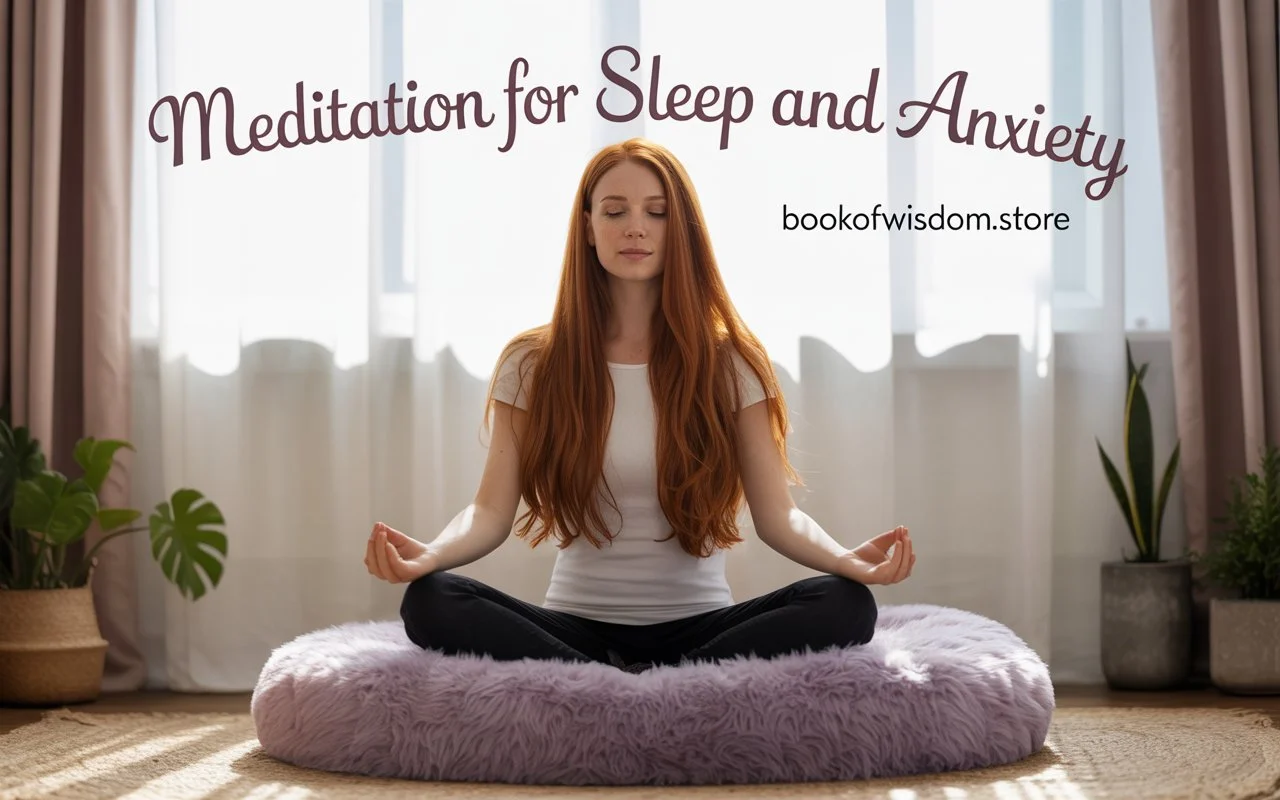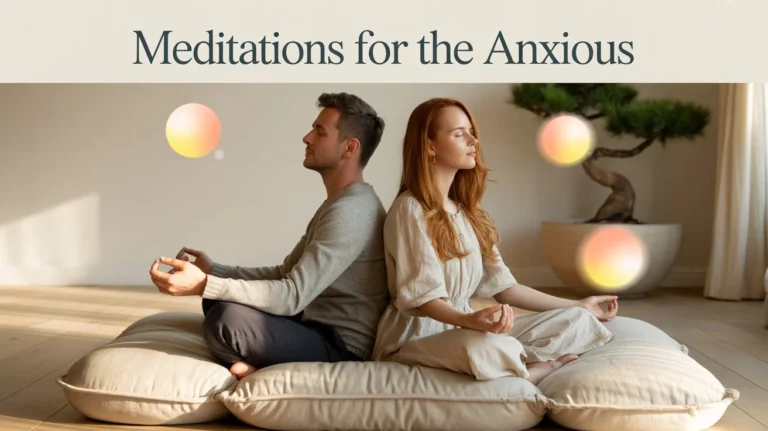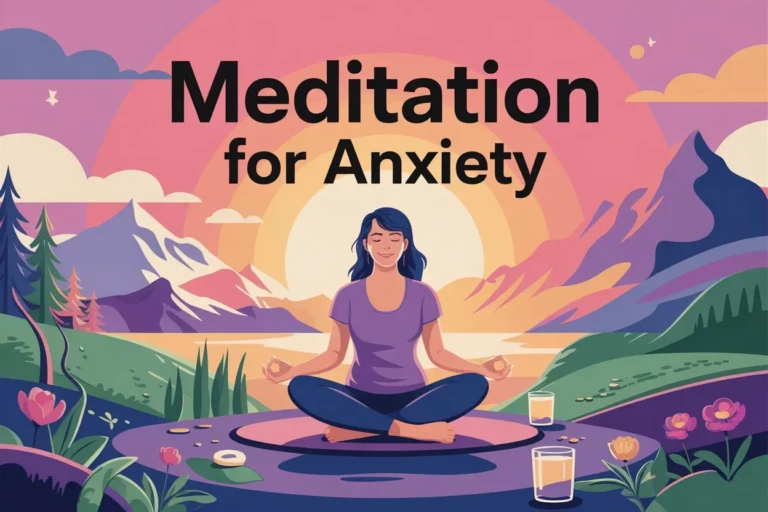Meditation for Sleep and Anxiety: Easy 3 Guides to Restful Nights and Calm Minds
Meditation for Sleep and Anxiety
Do you ever find yourself lying in bed, tossing and turning while your mind races with thoughts about the day or worries about tomorrow? You’re not alone. Millions of people struggle with sleep and anxiety, and often the two problems feed off each other. The more anxious you feel, the harder it is to sleep—and the less sleep you get, the more your anxiety spikes. It’s like being trapped in a loop that feels impossible to break.
This is where meditation for sleep and anxiety comes in. Meditation isn’t about shutting off your thoughts or becoming a monk on a mountain; it’s about learning to observe your mind and guide it gently toward calmness. When practiced regularly, meditation helps you slow down racing thoughts, relax your body, and prepare your nervous system for deep, restorative sleep. At the same time, it teaches you how to handle anxiety without letting it overwhelm you.
In this article, we’ll dive deep into how meditation for sleep and anxiety can transform your sleep, reduce anxiety, and help you wake up feeling refreshed instead of drained. We’ll explore the science, different meditation for sleep and anxiety techniques, and step-by-step guides you can try tonight.
Table of Contents
Understanding Sleep and Anxiety Disorders
Common Causes of Anxiety That Disturb Sleep
Anxiety doesn’t just happen out of nowhere—it’s often triggered by stressors such as work deadlines, financial struggles, or personal relationships. When your brain perceives these as threats, it activates your body’s “fight or flight” response. This rush of adrenaline, cortisol, and increased heart rate makes it nearly impossible to drift into sleep. Even when you do fall asleep, the quality of rest is poor because your body is stuck in a state of hyper-alertness.
Other factors, like overuse of screens before bed, consuming too much caffeine, or lack of a consistent sleep schedule, can amplify anxiety symptoms at night. For many people, bedtime becomes the quietest part of the day, which means anxious thoughts finally have room to surface and spiral.
The Vicious Cycle of Poor Sleep and Rising Anxiety
Sleep and anxiety are like two sides of the same coin—when one suffers, so does the other. Poor sleep increases irritability, lowers resilience to stress, and reduces the brain’s ability to regulate emotions. As a result, small worries can feel overwhelming, fueling more anxiety. That anxiety, in turn, makes it harder to fall asleep the next night. Over time, this cycle can lead to chronic insomnia and even worsen mental health conditions like depression.
Signs You May Need Meditation as a Solution
If you often:
- Lie awake worrying about things you can’t control
- Wake up in the middle of the night with racing thoughts
- Feel restless or jittery before bed
- Depend on sleep aids or alcohol to fall asleep
- Notice your anxiety worsening after a poor night’s rest
then meditation could be a natural, sustainable solution for you. Unlike sleeping pills, meditation addresses the root of the problem—teaching your mind and body how to relax and reset.
The Science Behind Meditation for Sleep and Anxiety
How Meditation Rewires the Brain
Meditation for sleep and anxiety literally changes the structure of your brain. Neuroscientists have discovered that regular meditation for sleep and anxiety increases gray matter in regions linked to emotional regulation, memory, and self-awareness. At the same time, it decreases activity in the amygdala—the part of the brain responsible for fear and anxiety. Think of it as reprogramming your brain to react less strongly to stressors.
Meditation’s Impact on Stress Hormones and Nervous System
When you meditate, your breathing slows, your muscles relax, and your heart rate steadies. This signals your parasympathetic nervous system—the “rest and digest” mode—to take over. Cortisol levels drop, which helps reduce anxiety. This relaxed state makes it much easier to fall asleep naturally, without the help of medications.
Research Studies Proving Meditation Works for Sleep and Anxiety
Several scientific studies back up meditation’s benefits. For example, a Harvard Medical School study found that mindfulness meditation for sleep and anxiety improved sleep quality in older adults with insomnia. Another study published in JAMA Internal Medicine revealed that people who practiced meditation had reduced anxiety, depression, and fatigue compared to those who didn’t. These findings prove that meditation is more than just a wellness trend—it’s a science-backed tool for better sleep and calmer days.
Different Types of Meditation for Sleep and Anxiety
Mindfulness Meditation
This is one of the most popular techniques and involves focusing on the present moment without judgment. When practiced at night, mindfulness helps you let go of worries about the past or future, allowing your mind to relax into the now.
Guided Meditation
Perfect for beginners, guided meditation involves listening to a teacher or audio recording that gently walks you through the process of relaxing your body and calming your mind. Many apps like Headspace, Calm, and Insight Timer offer guided sleep meditations.
Body Scan Meditation
This practice involves mentally scanning your body from head to toe, noticing areas of tension, and consciously releasing them. It’s excellent for people who hold stress in their bodies and struggle with physical restlessness at night.
Breathing Techniques and Pranayama
Simple breathing exercises, like the 4-7-8 method, can slow your heart rate and trigger relaxation. In yogic tradition, pranayama practices are especially effective at calming the nervous system and preparing the body for sleep.
Loving-Kindness Meditation
This technique involves sending feelings of love and compassion toward yourself and others. It reduces negative thinking and emotional tension, both of which can interfere with restful sleep.
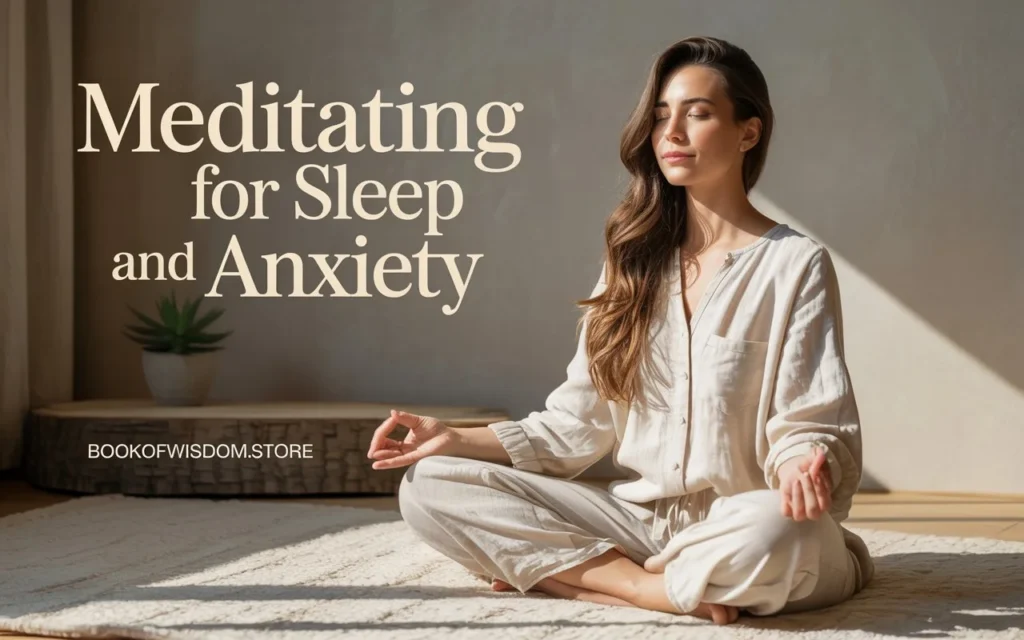
Step-by-Step Guide to Practicing Meditation Before Sleep
Preparing Your Space for Meditation
Your environment plays a huge role in how effective meditation will be. Choose a quiet, dimly lit space where you won’t be interrupted. Keep your phone away or on silent. You may want to use calming elements like soft music, essential oils (lavender works wonders), or even a weighted blanket.
Evening Routine to Ease into Meditation
Before you start meditating, create a bedtime ritual that signals to your body that it’s time to wind down. This could include:
- Turning off screens at least 30 minutes before bed
- Drinking a caffeine-free tea like chamomile
- Taking a warm shower to relax muscles
- Journaling to release lingering thoughts
These small steps set the stage for meditation to be more effective.
A Simple 10-Minute Meditation for Beginners
If you’re new, start small. Here’s a quick meditation you can try tonight:
- Sit or lie down in a comfortable position.
- Close your eyes and take a few deep breaths.
- Focus on the rise and fall of your chest as you breathe.
- If your mind wanders, gently bring it back to your breath.
- Continue for 10 minutes, then allow yourself to drift into sleep.
This simple practice can help you build consistency without feeling overwhelming.
Best Times to Practice Meditation for Sleep and Anxiety
Morning Meditation for Anxiety Relief
Starting your day with meditation for sleep and anxiety can set a calm, steady tone for the hours ahead. Many people wake up already anxious—thinking about tasks, responsibilities, or unfinished work. A short morning meditation for sleep and anxiety session helps center your mind, slow down mental chatter, and boost focus. Think of it as putting on an emotional shield that protects you from unnecessary stress throughout the day.
Morning meditation doesn’t need to be long. Even 5–10 minutes of mindful breathing or body scanning can prevent your stress levels from spiking. Over time, you’ll notice that you react to situations more calmly and have fewer racing thoughts at night, which ultimately improves sleep quality.
Evening Meditation for Sleep Preparation
The most powerful time for meditation is often right before bed. Your brain is already shifting toward a more relaxed state, and meditation for sleep and anxiety helps smooth that transition. Evening meditation practices like guided relaxation, body scans, or breathing exercises allow you to release the day’s stress so your body can naturally slide into deep sleep.
Consistency is key—when you make meditation part of your nightly routine, your brain begins to associate the practice with rest. Just like brushing your teeth signals bedtime, meditation can become a mental trigger that says, “It’s time to sleep.”
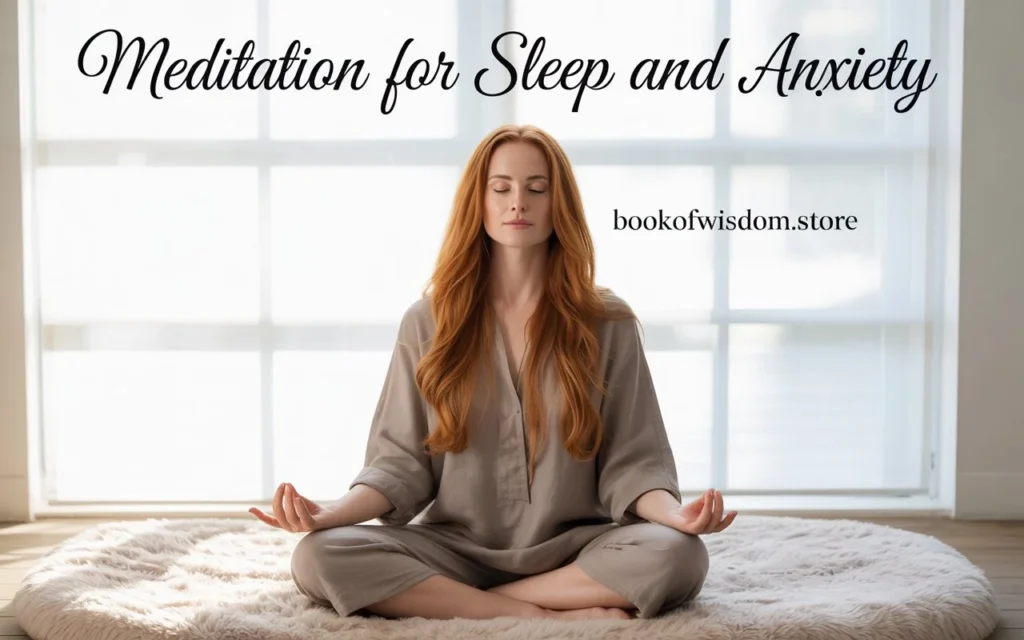
Midday Meditation for Resetting the Nervous System
Don’t overlook the power of midday meditation. If your stress levels climb during work, a 10-minute pause for breathing exercises or mindfulness can reset your nervous system. By reducing anxiety throughout the day, you prevent stress from carrying into bedtime. This means when you finally lay down at night, your mind is already in a calmer state.
Benefits of Meditation for Sleep and Anxiety
Improved Sleep Quality
Meditation for sleep and anxiety helps increase the time spent in deep sleep—the most restorative stage of the sleep cycle. This allows your body to heal, your mind to process emotions, and your energy to recharge fully. Unlike quick fixes like sleeping pills, meditation for sleep and anxiety improves long-term sleep health.
Reduced Anxiety Symptoms
By lowering cortisol and calming the amygdala, meditation decreases common anxiety symptoms like racing thoughts, tight chest, or restlessness. Over time, you’ll find that worries feel less overwhelming and easier to manage.
Enhanced Focus and Productivity
When anxiety decreases and sleep improves, you naturally gain more focus, mental clarity, and energy during the day. This makes you more productive and less likely to feel burnt out.
Stronger Emotional Regulation
Meditation teaches you to observe emotions without being consumed by them. Instead of reacting impulsively, you respond thoughtfully. This emotional balance reduces stress, arguments, and negative thought spirals that could otherwise disturb sleep.
Common Mistakes to Avoid When Meditating for Sleep and Anxiety
Expecting Instant Results
Meditation is not a magic pill. Many people quit after one or two sessions because they don’t see immediate changes. But like exercise, meditation requires consistency. The benefits compound over weeks and months, not days.
Forcing Thoughts to Stop
A huge misconception is that meditation means “emptying your mind.” In reality, it’s about noticing thoughts without judgment and gently returning your focus to the present. Forcing your mind to go blank often increases frustration and anxiety.
Inconsistent Practice
Meditation for sleep and anxiety works best when it becomes a daily habit. Sporadic practice won’t rewire your brain or nervous system. Even five minutes a day is better than one long session every two weeks.
Meditating in the Wrong Environment
Trying to meditate in a noisy, distracting space can make the practice frustrating. Ideally, choose a quiet room with soft lighting and minimal interruptions to create a sense of safety and calm.
Tools and Resources for Meditation
Meditation Apps
- Calm: Great for guided sleep meditations and bedtime stories.
- Headspace: Offers short, easy-to-follow meditations for beginners.
- Insight Timer: Thousands of free guided meditations across different techniques.
Music and Soundscapes
Soft background music, white noise, or nature sounds (like rain or ocean waves) can deepen meditation and prepare the brain for sleep.
Journaling as a Pre-Meditation Tool
Journaling helps clear mental clutter before you meditate. Write down your worries or tasks so your mind doesn’t cling to them when you’re trying to relax.
Props and Accessories
- Weighted blankets for grounding
- Eye masks to block out light
- Aromatherapy with lavender or chamomile essential oils
These tools don’t replace meditation for sleep and anxiety but enhance the experience, making it easier to commit.
Combining Meditation with Lifestyle Changes for Better Sleep and Reduced Anxiety
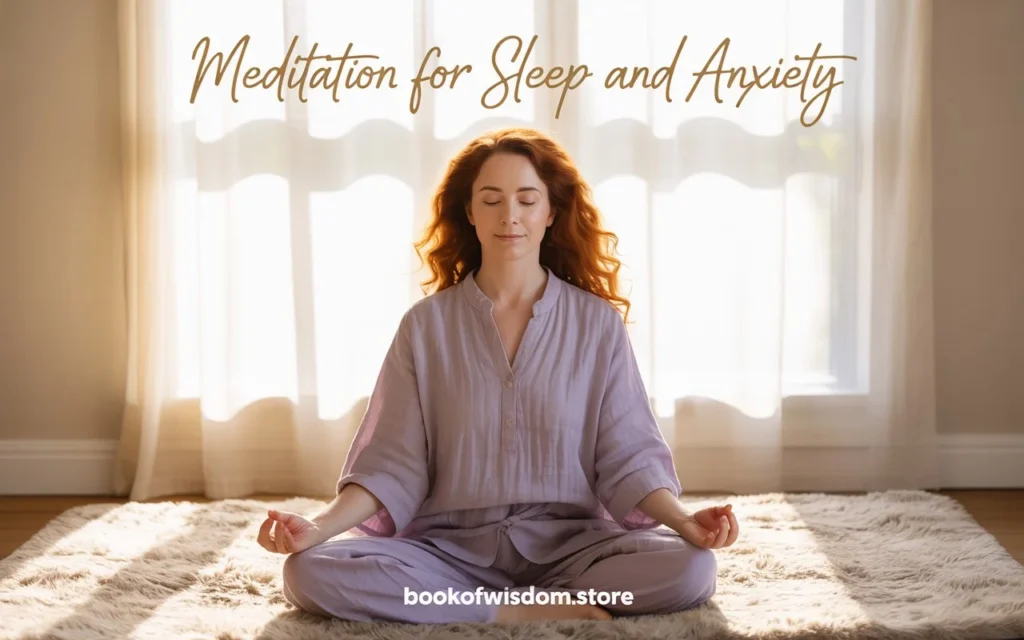
Diet and Nutrition
What you eat affects your sleep and anxiety levels. Too much caffeine or sugar can spike anxiety and make it harder to fall asleep. Instead, focus on calming foods like herbal teas, nuts, bananas, and whole grains that naturally support relaxation.
Exercise and Movement
Physical activity helps release pent-up stress and improves overall sleep quality. A gentle yoga session before meditation is especially effective for calming the mind and preparing the body for rest.
Limiting Screen Time
Blue light from phones and laptops interferes with melatonin production, delaying sleep. Turning off screens at least 30–60 minutes before meditation ensures your brain transitions smoothly into rest mode.
Consistent Sleep Schedule
Meditation is most effective when paired with good sleep hygiene. Going to bed and waking up at the same time every day helps regulate your circadian rhythm, making it easier to fall asleep naturally.
How Long Does It Take for Meditation to Work for Sleep and Anxiety?
Short-Term Effects You’ll Notice Quickly
One of the encouraging things about meditation is that you don’t have to wait months to feel something shift. For many people, even after the first session, there’s a sense of calm, lighter breathing, and reduced muscle tension. You may also notice that falling asleep feels smoother after a few minutes of guided meditation. This immediate relaxation response happens because meditation for sleep and anxiety quickly activates your parasympathetic nervous system.
Consistency Builds Stronger Results
While short-term effects are motivating, lasting benefits require consistent practice. Most experts recommend meditating daily for at least 6–8 weeks to experience noticeable changes in sleep patterns and anxiety levels. Just like going to the gym builds muscles over time, meditation strengthens your mental “relaxation muscle” gradually.
Personal Variations in Progress
Some people experience dramatic improvements in just a few weeks, while others may take longer. Factors like the severity of anxiety, lifestyle habits, and sleep hygiene all play a role. The key is patience. Think of meditation not as a quick fix but as a lifelong skill that keeps improving the more you practice.
Stories and Testimonials: Real People Using Meditation for Sleep and Anxiety
Case Study: A Busy Professional with Insomnia
Sarah, a 34-year-old marketing manager, struggled with sleepless nights caused by constant deadlines and high stress. She turned to guided meditation apps as a last resort. Within a month of nightly practice, she reported falling asleep within 20 minutes instead of lying awake for hours. Her anxiety during the day also reduced significantly, making her more productive at work.
Case Study: A Student with Performance Anxiety
Jake, a college student, faced extreme anxiety before exams. His nervousness made him restless at night, affecting his focus during the day. By practicing mindfulness meditation and breathing exercises twice daily, Jake noticed calmer test-day nerves and improved sleep quality.
Case Study: A Parent Managing Stress and Restlessness
Emily, a mother of two, often found her anxiety spiking late at night after managing work and family responsibilities. She adopted a combination of body scan meditation and journaling before bed. Within weeks, her sleep stabilized, and she no longer woke up in the middle of the night feeling overwhelmed.
These stories highlight that meditation isn’t just a theory—it’s a practical, real-world solution that adapts to different lifestyles.
Meditation vs. Medication: Which Is Better for Sleep and Anxiety?
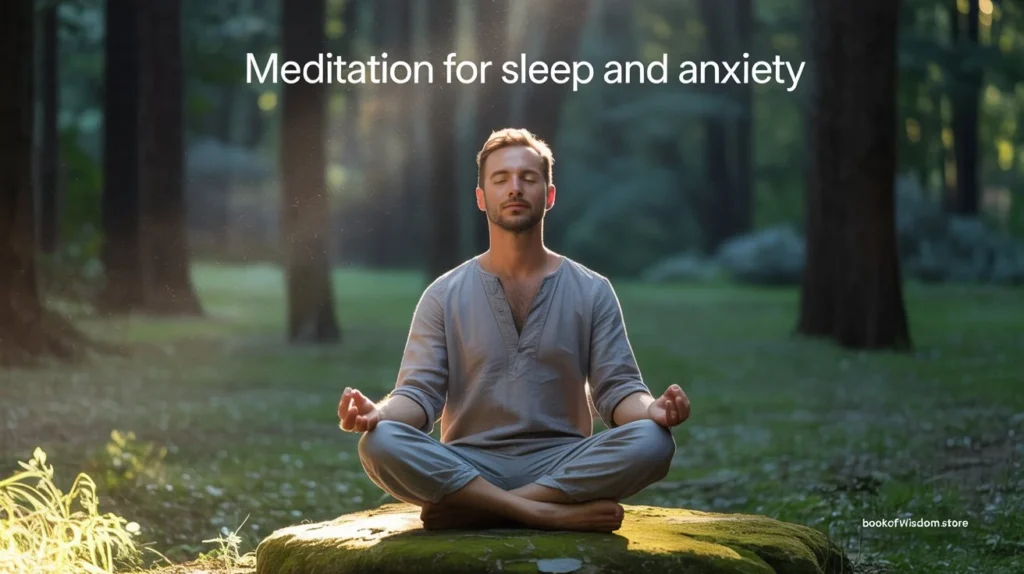
Pros and Cons of Medication
Medication for sleep and anxiety can provide fast relief for severe insomnia and anxiety. Sleeping pills or anti-anxiety drugs work quickly but come with side effects like dependency, morning grogginess, or tolerance over time. They treat symptoms but don’t address the root cause of restlessness.
Why Meditation Offers a Long-Term Solution
Meditation, on the other hand, trains the brain and body to naturally enter states of calm and rest. It doesn’t carry risks of addiction or harmful side effects. While it requires patience and effort, meditation creates lasting resilience against stress and builds healthier sleep habits.
The Ideal Approach: Integration
For some people, especially those with chronic conditions, combining medication with meditation under professional guidance can be the most effective approach. Medication may provide short-term stability, while meditation builds long-term self-regulation skills.
Tips for Staying Consistent with Meditation Practice
Start Small and Build Up
Instead of jumping into 30-minute sessions, begin with 5 minutes a day. Once it feels natural, gradually increase your practice. This prevents overwhelm and makes meditation sustainable.
Set Reminders and Create Rituals
Consistency often comes from habit-building. Set an alarm or tie meditation to an existing routine, like brushing your teeth before bed. Over time, meditation for sleep and anxiety will become second nature.
Track Your Progress
Journaling about your sleep quality, mood changes, or reduced anxiety levels helps you stay motivated. Apps often include progress trackers that visually show how far you’ve come.
Find a Style That Fits You
Don’t force yourself into a technique that doesn’t resonate. If mindfulness feels too difficult, try guided meditations. If you’re restless, body scan or breathing practices might work better. Meditation is flexible—adapt it to your personality and lifestyle.
Meditation for sleep and anxiety is more than just a trendy wellness practice—it’s a life-changing tool for anyone struggling with restless nights and anxious thoughts. By training your mind to slow down and your body to relax, meditation allows you to break the vicious cycle of poor sleep and rising anxiety. Whether you choose mindfulness, guided meditation, or simple breathing exercises, consistency is the key to reaping the benefits.
It won’t happen overnight, but with patience, meditation for sleep and anxiety becomes a natural part of your life, improving not only sleep and anxiety but also your overall health and happiness. Instead of chasing temporary fixes, meditation empowers you with lifelong skills for peace, balance, and resilience.
So, the next time you find yourself staring at the ceiling at 2 a.m. with racing thoughts, remember—you already hold the key to calm within you. All you need to do is pause, breathe, and begin.
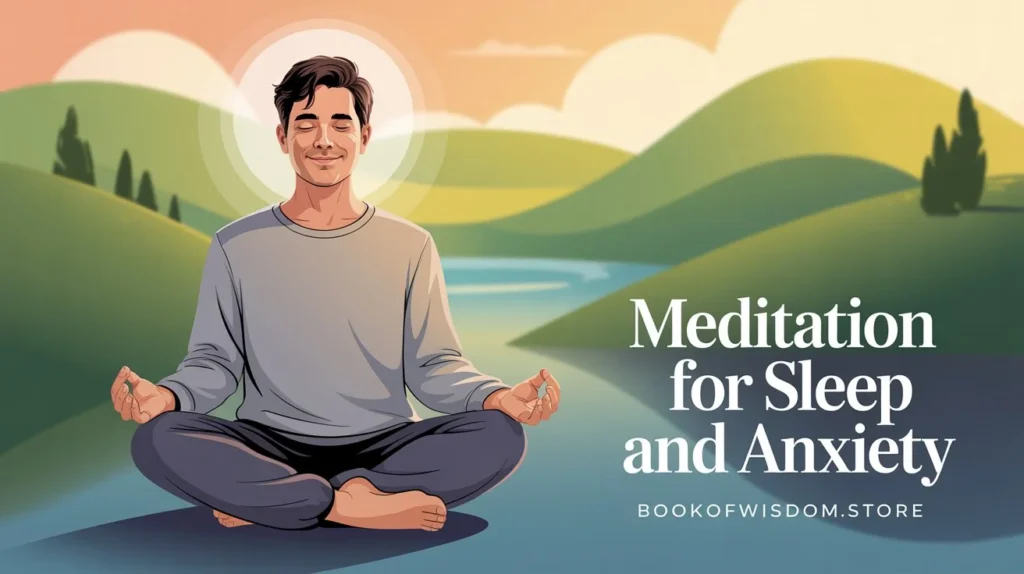
FAQ for Meditation for Sleep and Anxiety
What is meditation for sleep and anxiety?
Meditation for sleep and anxiety is a practice that combines relaxation techniques and mindfulness to calm the mind, reduce stress, and promote deep rest.
How does meditation help with anxiety and insomnia?
Meditation for sleep and anxiety reduces overthinking, lowers stress hormones, and activates the body’s relaxation response, making it easier to fall asleep and manage anxiety.
How long should I meditate before sleep?
Even 10–20 minutes of meditation for sleep and anxiety before bed can significantly improve sleep quality and reduce nighttime anxiety. Longer sessions may deepen the benefits.
Can beginners practice meditation for sleep and anxiety?
Yes, beginners can start with simple guided meditations, breathing exercises, or body scans designed to ease anxiety and support restful sleep.
What is a 120-day step-by-step meditation plan for sleep and anxiety?
A 120-day step-by-step meditation for sleep and anxiety program gradually trains your nervous system to relax, reduces nighttime rumination, and builds habits that support better sleep and lower anxiety. Use daily practice (start 10–15 minutes) and progress through four 30-day phases.

